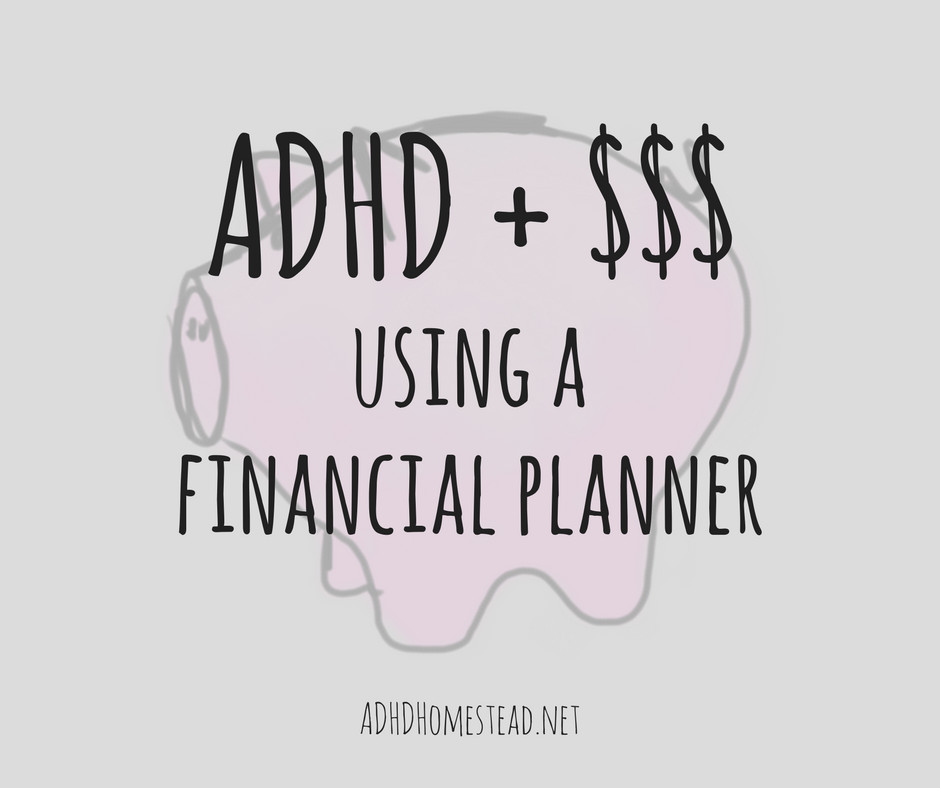A lot of adults with ADHD experience financial stress. Fiscal responsibility requires impulse control, tolerance for boring paperwork, and an ability to plan ahead and defer pleasure spending. We have to stay on top of our bills (and their due dates). And that’s assuming we have a steady job that covers expenses with room for savings.
I’ve always considered myself good with money — ADHD and all — but I want to tell you about my recent experience with a financial planner. I balked at the idea when my husband first suggested it. After all, I (and most of my family) take pride in my ability to handle money responsibly, without asking for help. However, hiring a financial planner was one of my best decisions in recent memory.
Regardless of where you are with money, I highly recommend a financial planner to make sure you’re on the right track. Here’s what the process looked like for us.

Financial planners aren’t just for rich people
While many wealth management consultants only see people with over $1 million in assets, there’s a whole network of planners who take on smaller clients. At first, I thought hiring a financial planner made a statement about how much money you had: enough that you couldn’t figure out what to do with it. But we all need to save for the future, even if we’re not making a ton of cash.
Our financial planner reviewed the full inventory of our assets — from our bank accounts, to our employer-sponsored retirement accounts, to an IRA my grandmother insisted I open as a teenager — and gave us a list of tweaks. His suggestions had little impact on our current lifestyle, but those investments will be worth a lot more down the road. I’d been on the right track, funneling money into long-term savings to “hide” it from our temptation to make impulse purchases. Our financial planner helped us make sure we were saving the right amount, and that the money we saved was being invested wisely.
If you don’t have much, it’s even more important to run a tight financial ship. Our financial planner recommended using automatic transfers. We love them. Money disappears into accounts we’re keeping for retirement, a new kitchen, and our son’s college education. I realized we need to prepare for R’s preschool tuition bill. It isn’t due for several months, but it could hurt our emergency buffer if we don’t set money aside. I also started brainstorming ways we could save on our monthly expenses. I used to think relatively little about money and hope for the best. When there was money left over, I transferred it to savings. Otherwise, our paychecks covered everything we needed. Now I’m more conscious of big-ticket expenses coming up — and how much we need to save — thanks to automatic transfers that keep me on a schedule.
How we found our financial planner
We started our search through the Garrett Planning Network. Most of Garrett’s planners work with smaller clients, and they don’t receive any commissions for their work. In other words, they charge a fee for the hours they spend crafting your plan, and that’s the only way they get paid. They have an obligation to work in your best interest.
After we made a list of planners in our region, we narrowed it to one who looked like the best fit. Then we arranged a get-to-know-you meeting. I used this guide from the Wall Street Journal to brush up on the basics of the business. Before our meeting, our planner asked for a basic inventory of our finances. We met and discussed expectations, made sure we understood his services and fees, and ultimately decided to proceed.
My husband was skeptical at first. I’d done all the initial research, and he had only the planner’s website as an introduction. After our initial meeting, he was completely sold. This was critical: we were trusting someone else with part of our financial future. I wasn’t willing to pull the trigger unless we both felt confident.
Deadlines, deadlines
Not only did our financial planner give us advice we wouldn’t have thought of on our own, he gave us a to-do list. We’ll probably check in with him again in a year or two. I’ve been more motivated to carry out his suggestions than I would’ve if I’d been on my own. If nothing else, I don’t want to show up to our check-in empty-handed.
For adults with ADHD, this readymade to-do list — not to mention having someone else do the mountain of research on financial minutiae — seems like a fantastic idea. A future check-in establishes external accountability, something notably absent in my previous DIY financial management strategy. As hesitant as I was to enlist help with my financial future, I feel like it’s already paid for itself.
What do you think? Have you worked with a financial planner? Do you struggle with money?
Hey there! Are you enjoying The ADHD Homestead?
Here's the thing: I don't like ads. I don't want to sell your attention to an advertising service run by the world's biggest data mining company. I also value my integrity and my readers' trust above all, which means I accept very few sponsorships/partnerships.
So I'm asking for your support directly. For the cost of one cup of coffee, you can help keep this site unbiased and ad-free.
Below you will find two buttons. The first lets you join our crew of Patreon pals and pledge monthly support for my work. Patrons also have access to my Audioblogs podcast. The second takes you to a simple donation page to pledge one-time or recurring support for The ADHD Homestead, no frills, no strings. Do whichever feels best for you!

